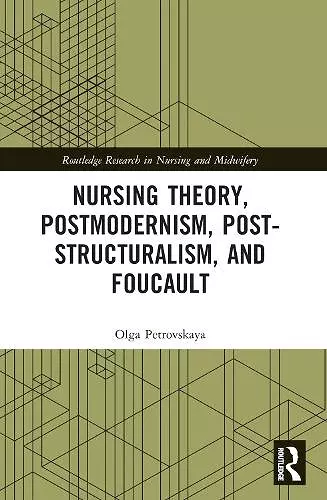Nursing Theory, Postmodernism, Post-structuralism, and Foucault
Format:Paperback
Publisher:Taylor & Francis Ltd
Published:27th May '24
Currently unavailable, and unfortunately no date known when it will be back
This paperback is available in another edition too:
- Hardback£145.00(9781032047287)

Nursing Theory, Postmodernism, Post-structuralism, and Foucault critiques mainstream American nursing theory and its use of post-structural theory, comparing and contrasting how postmodern and post-structural ideas have been used fruitfully in nursing research and theorizing elsewhere.
In the late 1980s, references to post-structuralism and Michel Foucault started to appear in nursing journals. Since then, hundreds of nursing publications have cited postmodernism and key post-structural ideas such as power/knowledge, discourse, and de-centring the human subject. In Nursing Theory, Postmodernism, Post-structuralism, and Foucault, Olga Petrovskaya argues that the application of these ideas is markedly different in American nursing theory scholarship compared to nursing theoretical scholarship generated outside the canon of "unique" nursing theory. Analysing relevant literature from the late 1980s through 2010s, she demonstrates this difference, arguing that American nursing theory calcified into a matrix of dogmas built on logical positivism, wary of "borrowed" theory, and loyal to a "unique nursing science." Post-structural ideas that fit the matrix, such as criticism of medicine, are sanctioned, whereas ideas sceptical of humanistic agendas including those that challenge American nursing theory are rendered meaningless. In contrast, other nurse scholars from Britain, Australia, Canada, and what the author calls the American enclave group engaged with postmodern and post-structural perspectives to enrich their research and invite readers to rethink nursing practice. The book showcases examples of their intelligent, creative theorizing. Arguing that American nursing theory enervated nursing theorizing, Petrovskaya calls for opening this matrix to theoretical and methodological creativity, less rigid categories of scholarship, and healthy self-examination.
Making the case that post-structural ideas are vital for nurses’ ability to critically reflect on their discipline and profession, this is a necessary read for all those interested in nursing theory, philosophy, and praxis.
Chapter 1 of this book is available for free in PDF format as Open Access from the individual product page at www.routledge.com. It has been made available under a Creative Commons Attribution-Non Commercial-No Derivatives 4.0 license.
This book constitutes the first systematic attempt to bring together the vast field of postmodern and post-structuralist nursing literature from the late 1980s through the first decade of the 2000s. Olga Petrovskaya demonstrates this literature’s significant contribution to ‘theorizing nursing’ in a mode of critique. Critique here refers to analyses attentive to historicity, materiality, and politics of nursing practice and nursing knowledge. She contrasts this with the mostly American literature on ‘nursing theory,’ construed mainly in terms of formal systematization. Her main argument is that the American understanding of ‘nursing theory’ has dominated nursing textbooks across the globe, to the extent that the many modes of ‘theorizing nursing’ are rendered mostly invisible. She raises important questions about how these two almost radically opposed conceptualizations of theory and their methods and/or status in nursing qua knowledge influence what is taught to and studied by nursing students and scholars. The work is highly original in scope and depth and should be considered required reading for all nursing scholars.
Miriam Bender, PhD RN FAAN
Associate Professor
Founding Director, Center for Nursing Philosophy
Sue & Bill Gross School of Nursing
University of California, Irvine
There’s a lot to be written about the history of academic nursing theory, and this is a hefty contribution to our understanding of one prominent slice of it. Olga Petrovskaya has written an intriguing analysis of American nursing scholarship, and the way in which its parochialism, self-celebration, ex officio nursing values, and old-fashioned positivism preclude serious consideration of postmodern and poststructuralist ideas, rendering them largely unintelligible to US nurses. Petrovskaya describes American theory’s three responses to French philosophy, Foucault in particular. Ignore it. Dismiss it. Assimilate a domesticated, housebroken version of it. And she suggests that this is consistent with the ideal of an isolationist ‘unique nursing science’ – its drawbridge up, its portcullis down – freezing out any challenge to its canon from other philosophies, other disciplines, other parts of the world. Perhaps this book will turn out to be the unstoppable force that dislodges the hitherto immovable object of American nursing theory. That could be a watershed moment. But this is American nursing theory. I’m not holding my breath.
John Paley
University of Worcester
ISBN: 9781032343204
Dimensions: unknown
Weight: 453g
174 pages